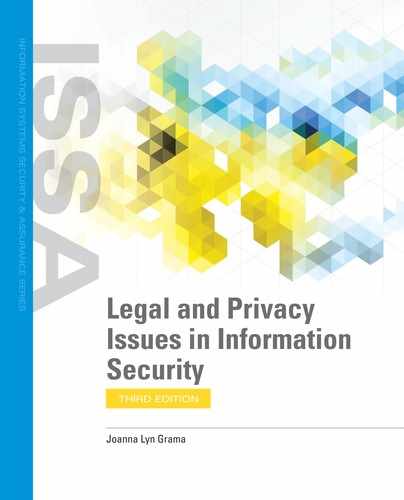1. The ChoicePoint data breach was the triggering event that caused many states to create data protection laws.
A. True
B. False
2. California’s breach notification law went into effect in ________.
3. Most states define personal information as name plus which of the following elements?
A. Date of birth
B. Address
C. Phone number
D. Social Security number
E. None of these is correct.
4. An encryption safe harbor is ________.
5. What is a state breach notification law?
A. A law that requires that residents be notified if a dam breaks
B. A law that requires that residents be notified if a business has a security breach that compromises their personal data
C. A law that requires that residents be notified if a business has a security breach that compromises the business’s confidential data
D. A law that requires that businesses be notified if a government has a security breach that compromises the business’s confidential data
E. None of these is correct.
6. Which types of entities are sometimes excluded from breach notification laws?
A. GLBA financial institutions
B. HIPAA-covered entities
C. Out-of-state businesses
D. GLBA financial institutions and HIPAA-covered entities
E. GLBA financial institutions, HIPAA-covered entities, and out-of-state businesses
7. What is not a business day?
A. An official workday
B. A day of the week that includes Monday through Friday
C. Memorial Day
D. Tuesday
E. None of these is correct.
8. “Clear and conspicuous” notice means that ________.
9. Which states allow data breach notification to be given by telephone?
A. California
B. Colorado
C. North Carolina
D. California and Colorado
E. Colorado and North Carolina
10. What technology standards are permitted under the Nevada encryption law?
A. PCI DSS
B. SO 1799
C. NIST
D. FTC
E. HIPAA
11. Which states have required businesses to follow all, or part, of the PCI DSS?
A. Minnesota
B. Nevada
C. California
D. Minnesota and Nevada
E. Minnesota and California
12. A private cause of action is ________.
13. If the U.S. Congress creates a federal breach notification law, what happens to state laws?
A. They are no longer valid.
B. They are still valid as long as they are stricter than federal law.
C. They are still valid in their original form.
D. They are still valid as long as they are weaker than federal law.
E. None of these is correct.
14. What is the purpose of legislative history?
A. To help determine which laws to abolish
B. To help decide how to create new laws
C. To help determine how old a law is
D. To help determine what a legislature intended when it created a law
E. None of these is correct.
15. What is one of the biggest differences between civil and criminal law?
A. The amount of fines
B. Whether a person can be sentenced to prison
C. How long the offense stays on your criminal record
D. The type of judge that hears the case
E. The color of the prison jumpsuits
